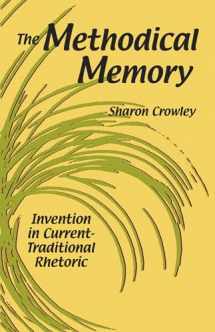
The Methodical Memory: Invention in Current-Traditional Rhetoric
ISBN-13:
9780809330010
ISBN-10:
0809330016
Edition:
Reprint
Author:
Sharon Crowley
Publication date:
2010
Publisher:
Southern Illinois University Press
Format:
Paperback
230 pages
FREE US shipping
Book details
ISBN-13:
9780809330010
ISBN-10:
0809330016
Edition:
Reprint
Author:
Sharon Crowley
Publication date:
2010
Publisher:
Southern Illinois University Press
Format:
Paperback
230 pages
Summary
The Methodical Memory: Invention in Current-Traditional Rhetoric (ISBN-13: 9780809330010 and ISBN-10: 0809330016), written by authors
Sharon Crowley, was published by Southern Illinois University Press in 2010.
With an overall rating of 4.4 stars, it's a notable title among other
books. You can easily purchase or rent The Methodical Memory: Invention in Current-Traditional Rhetoric (Paperback) from BooksRun,
along with many other new and used
books
and textbooks.
And, if you're looking to sell your copy, our current buyback offer is $0.3.
Description
In this first sustained critique of current-traditional rhetorical theory, Sharon Crowley uses a postmodern, deconstructive reading to reexamine the historical development of current-traditional rhetoric. She identifies it (as well as the British new rhetoric from which it developed) as a philosophy of language use that posits universal principles of mind and discourse. Crowley argues that these philosophies are not appropriate bases for the construction of rhetorical theories, much less guides for the teaching of composition. She explains that current-traditional rhetoric is not a rhetorical theory, and she argues that its use as such has led to a misrepresentation of invention.Crowley contends that current-traditional rhetoric continues to prosper because a considerable number of college composition teachers—graduate students, part-time instructors, and teachers of literature—are not involved in the development of the curricula they are asked to teach. As a result, their voices, necessary to create any true representation of the composition teaching experience, are denied access to the scholarly conversations evaluating the soundness of the institutionalized teaching methods derived from the current-traditional approach.


We would LOVE it if you could help us and other readers by reviewing the book
Book review

Congratulations! We have received your book review.
{user}
{createdAt}
by {truncated_author}


